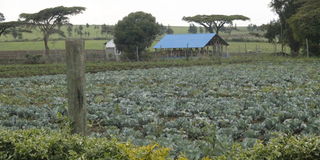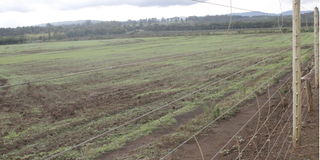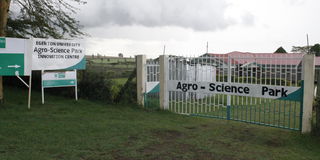Feature: Nakuru’s industrial park that will revolutionise agriculture

A section of the agro-science farm at Egerton University.
The vast green Ngongongeri farm at Egerton University’s main campus in Njoro is the proposed site for the upcoming Lord Egerton agro-industrial park.
The productive land, well secured with an electric fence in the Mau Forest ecosystem extends right from the university’s 50-acre agro-science park, which sits about two kilometres from the university’s main entrance.
Egerton has given out 200 acres of this land towards the establishment of what will be the second industrial park in Nakuru county after the one in Naivasha.
The park represents the future of industrialisation in Nakuru County, as it is expected to position the county as a world-class trade and investment hub.
At least 5,000 new jobs are set to be created from the project, which will host a variety of industries, including agro processors, ICT hubs, energy-sector companies, engineering and construction firms and chemical industries.

Part of the land set aside for the establishment of Lord Egerton agro-industrial park.
Feasibility studies conducted by the World Bank indicated that Egerton Agro-Park will serve a total of nine counties neighbouring Nakuru County in central Rift, that will provide a source for raw materials from one million acres of arable land.
The counties are Nakuru, Kericho, Bomet, Narok, Baringo, Nyandarua and Laikipia, among others. These will provide raw materials for agro processing of key products including cereals, tea, coffee, pyrethrum, flowers and vegetables, timber, pharmaceuticals and livestock and dairy processing.
Over 10 million people are set to benefit from the multibillion-shilling project that will host more than 10 research and agricultural institutions.
Prof Paul Kimurto, the director of Marketing, Resource Mobilisation and Agro-park said the park will mainly focus on agriculture research and development, incubation centres, demonstration farms and medium scale manufacturing hub for value addition.
“The focus is to create employment opportunities, improve the livelihoods in agriculture-dependent regions, reduce post-harvest losses, contribute to food security and accelerate economic growth in the country,” said Prof Kimurto.
The development of the support infrastructure such as power, water and the park ring road is expected to commence in few months’ time, in a bid to attract private investors into establishing food processing plants that will add value on agricultural produce.
According to Prof Kimurto, the idea of an agro-park was birthed 10 years ago when the university felt the need to contribute to the achievement of the vision 2030 flagship projects.
He noted that the university chose to focus on three areas; agriculture, environment and natural resources.
“The university felt that the best way to promote agricultural innovations is through the establishment of an agro science park which would then develop into an industrial park. We also embarked on the project to rehabilitate the Mau ecosystem as well as establishment of the Chemeron dry lands research station,” said Prof Kimurto.

The agro-science park at Egerton university, main campus.
County executive for Trade and Industry Stephen Kuria said the county is in the process of acquiring a title deed for the land and preparing designs for the park before submitting it to the ministry for approval.
Mr Kuria revealed that the county government has already committed Sh100 million towards the project in this financial year.
The county executive further said the county is in talks with Egerton university to increase the land from 200 acres to at least 1,000 acres.
This he said is informed by the many investors who have expressed interests to set up their companies at the park.
According to Mr Kuria, at least 10 companies, both local and international, have expressed interest to set up shop at the proposed park.
“The project is expected to turn around the economy of Njoro and Nakuru county as a whole,” said Mr Kuria.
